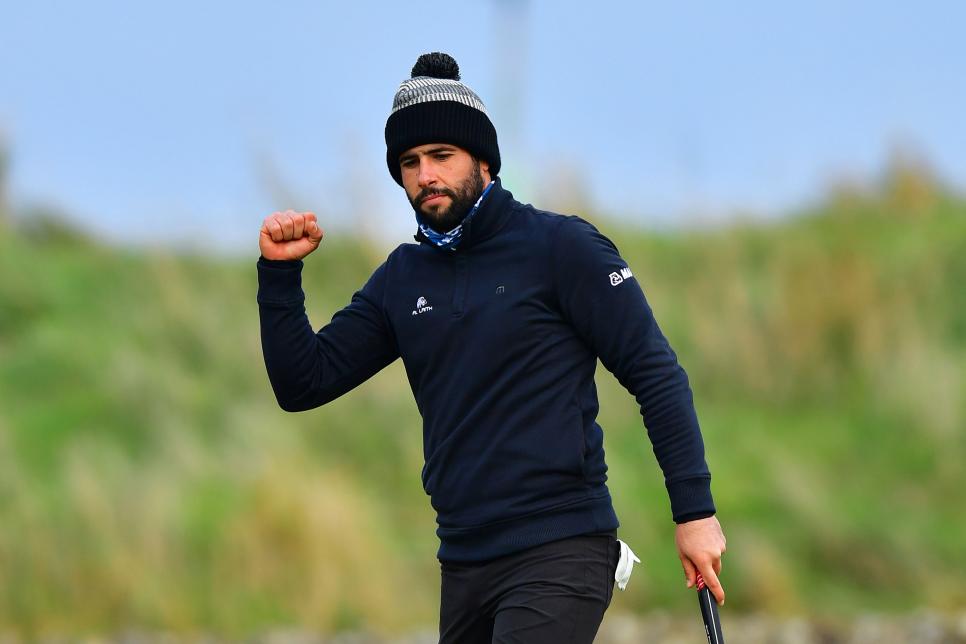Mark Runnacles
Adrian Otaegui celebrates holing the winning putt on the 18th green during the final round of the European Tour’s Scottish Championship.
By John Huggan
When Adrian Otaegui arrived at the Sam Torrance-designed Fairmont course just outside St. Andrews for the inaugural Scottish Championship, the 27-year-old Spaniard was most notable for two things. First, despite owning two victories on the European Tour—the 2017 Paul Lawrie Match Play and the 2018 Belgian Knock-Out—Otaegui had yet to win a 72-hole stroke-play event.
Second, and less positively, the man from San Sebastian on Spain’s blustery north coast is well-known as one of the slowest players on the Old World circuit. Famously outed by Italy’s Edoardo Molinari, Otaegui was one of three players who the tour (privately) fined $3,000 in 2019 for their pedestrian pace. And earlier this year, after playing in the same group as Otaegui in the final round of the Saudi International, South Africa’s Justin Harding variously labelled his ponderous companion a “tortoise” and “inconsiderate.”
All of which makes Otaegui’s third European Tour victory both welcome and somewhat ironic. Making light work of what was a three-shot deficit, the soon-to-be champion raced past overnight leader Matt Wallace, who closed with a 71. More specifically, Otaegui made eight birdies in 11 holes starting on the fifth en route to what was, eventually, a comfortable four-shot victory over the world No. 51.
The winner’s Sunday 63, like his opening 62, included 10 birdies, and his 23-under-par 265 aggregate score was worth €156,825 from the €1 million prize fund. On-form Aaron Rai, adding to his recent runner-up finish at the Irish Open and win at the Scottish Open, was third, six-shots back, one ahead of two more Englishmen, Chris Paisley and Garrick Porteous.
“My whole week has been very good,” said Otaegui, the third Spaniard after Seve Ballesteros and Rafa Cabrera-Bello to win a professional event on Scottish soil. “But today my aim was just to give myself lots of chances, which I did very well. My iron play was especially pleasing. I hit some great shots into the greens to set up all those birdies. The 7-iron to the 11th was really important after I made my only bogey of the day at the previous hole. And I made all the important putts, the six-footers, you need to make. I’m very happy and very proud to win here at St. Andrews.”
Otaegui’s win was not his first in the land where golf began, however. Ten years ago he lifted the British Boys’ title over two Ayrshire links, Barassie and Dundonald, displaying an early propensity for both match play and golf by the seaside. Which is no great surprise. Another former winner of that junior title, two-time Masters champion Jose Maia Olazabal, is also a native of San Sebastian and something of a mentor to his younger compatriot.
“I’ve been very lucky to know Jose for many years,” Otaegui said. “I have played many rounds and practiced many times with him. He has been a massive inspiration for me. I owe him so much. Today I would not have been the same out there without his influence. I have learned so much from him.”
Looking ahead, Otaegui revealed himself to be a “day-to-day” guy. In other words, he’s not big on setting specific long-term goals. The end of the year is far enough for him. But he was clearly relieved to have broken through in stroke play, what he called “my favorite way of golf. You have to play very solidly and very consistently all four rounds, which I think I did this week.”
“I obviously have long-term ambitions, but those goals are there to make you practice better, practice harder,” he said. “Once you are at a tournament, you just have to focus on the present. My dream has always been to win the Ryder Cup, to win majors, but right now I’m just focused on the end of the season. To get ready for the DP World [Tour Championship], to get up in the rankings, and obviously have more playing opportunities for next year.”
In that respect at least, he’s off to a fast start.









